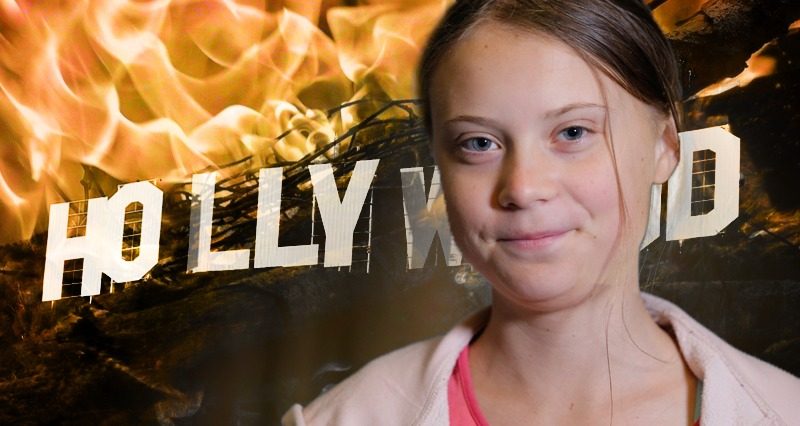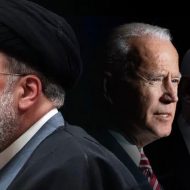Swedish ecoactivist Greta Thunberg remains a hot topic in world media. After her infamous “How dare you”speech, she organized an environmental tour and is now meeting with various Hollywood stars.
Just recently, she met with Leonardo DiCaprio, who described her as leader for our times. She also cycled with Arnold Schwarzenegger, who called her a hero, and was invited on the Ellen show.
It was fantastic to see my friend and one of my heroes @GretaThunberg last week and go on a bike ride around Santa Monica together and I was so pumped to introduce her to my daughter Christina. Keep inspiring, Greta! pic.twitter.com/3Q6ZuInJHY
— Arnold (@Schwarzenegger) November 4, 2019
I was honored to meet the amazing @GretaThunberg.
Find out how you can make a difference: https://t.co/HeDcWcHcTE pic.twitter.com/bqNJV38Ekj
— Ellen DeGeneres (@TheEllenShow) November 1, 2019
The awareness campaign is rather like the beginning of the #imwithher movement in 2016, when major show-business stars began to declare their support for Hillary Clinton. As part of the broad social push toward multiculturalism and liberal values, it quickly became shameful for anyone in the mass-media to admit support for Donald Trump… now, however, environmental issues have become an even more convenient platform for these political media campaigns.
Greta found herself on the news once again when she rejected an important environmentalist award. This was a good PR step: now Greta is not only seen as a strong young environmentalist, she is also humble and selfless.
I have received the Nordic Council’s environmental award 2019.
I have decided to decline this prize.
Jag har vunnit Nordiska Rådets miljöpris 2019.
Jag har valt att inte ta emot priset.
Full statement here: https://t.co/aFWY46EAR3— Greta Thunberg (@GretaThunberg) October 29, 2019
Rational arguments don’t work
The main emphasis of contemporary eco-activists is emotional and based in fear. Big economic players benefit most from this strategy: at some point, investors, frightened by the toxicity of the topic, began to fear investing in traditional energy. The emotional noise permeating society prevents any rational political argumentation.
According to Norbert Bolz, the mass media age is an age of indignation pessimism and angst-driven rhetoric, where moral entrepreneurs take advantage and make money based on emotions… he calls it the ecology of the end of the world.
“Greta offers everything that the media needs: personalization and emotionalization of politics, the religious disaster expectation of the “climate catastrophe” and the ascetic program to save the world… Instead of going to school, she goes to press conferences, interviews and photo sessions. She speaks to the UN and the powerful of Davos, gets a kiss on the hand from Juncker and an audience with the Pope. The sixteen-year-old is showered with prizes and has already been nominated for the Nobel Peace Prize. But at the latest during the “climate-neutral” sailing trip to the USA, some people asked themselves: “Mission or marketing?”
The consequences
The first concrete results of the Gretocalypse have become evident. For example, at the beginning of the year, the Belgian Minister for Environment, Joke Schauvliege, was forced to resign for criticizing the environmental movement and the young people who skipped school to participate in it. The minister was even forced to apologize to the children.
Another example is the pressure put on Chancellor Angela Merkel, despite that she generally falls in line with the globalists’ demands. However, Frau Merkel also remains true to realpolitik when it comes to economic issues: after Greta’s speech at the UN, Merkel pointed out that the young girl had skipped over some of the possibilities afforded by modern technology. As a result, the Bundestag deputy from the Green Party, Lisa Badum, criticized the chancellor and accused the German authorities of strangling attempts at environmental transformation.
A new potential victim of the campaign is the Australian prime minister Scott Morrison. Morrison pledged to outlaw climate boycotts, arguing they threaten the economy… Now, supporters of Fridays for Future have begun to actively criticize him on social media- it is beginning to look like they might force his resignation as well.
The European market is changing
These are far from the only examples of environmentalists directly interfering in political and economic processes.
British Prime Minister Boris Johnson made every effort to ensure that the British “shale revolution” would take place despite all the environmental protests and criticism of opponents. However, the Greens eventually won this battle at well. On the eve of the early parliamentary elections, Johnson was forced to announce a moratorium on fracking in the Kingdom.
Experts believe that Johnson’s pragmatic plan could have solved the problem of Britain’s dependence on the European market and on gas giants (such as Russia, Qatar and Norway). Interestingly, before this incident, environmental problems related to fracking were almost never considered by the government.
It is obvious to everyone that Europe has serious energy problems. There is a strong need for gas, yet, its production is declining. There is no alternative: either Great Britain will develop shale gas or it will have to import a significant part of it from external partners.
In the Netherlands, green activists have already defeated common sense: as a result of potential danger from earthquakes, the authorities have decided to stop energy production at Groningen field.
Demonstrators at environmental protests around the world shout the same slogans: “No more coal! No more oil! Keep our carbon in the soil!”
… but what do they offer in return?
So far, the environmental agenda has been purely negative. Don’t use so much electricity, don’t travel by plane, don’t eat meat… perhaps it would be better not to breathe at all?
Iowa City climate strikers! @uiowa students have been calling for an end to UI coal burning since 2003! #EndCoalUI #NoMoreExcusesUI @ZacharyOS @TheDailyIowan @GretaThunberg @FFF_USA @Fridays4future @marcelomena @fmeggers @JerryatCop21 @uisg @JoeBolkcom @HawkeyeGEOG @CGRER pic.twitter.com/cACWuHpXdS
— Student Climate Strike Iowa City (@moogysmaszimo) November 1, 2019
All of this despite the fact that, in reality, climate change is barely even related to human activity.
Given the professional information campaign organized around Greta, there is no doubt about the political and economic motives of the organizers. Let us remind you that Greta Thunberg was conscripted by a Swedish industrialist who saw her as an excellent business opportunity.
UWI has also covered the potential ideological consequences of the eco-movement.
When a group’s rhetoric is based on guilt and fear, it is easier to launch legislative and financial mechanisms to support it. After you have frightened people with “disaster,” you try to convince them with science, allocate funds for research “in the public interest” and then consolidate the political decisions.
For example, one of the main topics brought up by these Greta-inspired ecologists are forest fires. Thunberg’s supporters are convinced that the fires are related to climate change… but how?
Siri show me one image that perfectly encapsulates the climate crisis pic.twitter.com/5Ytj2nTi8Q
— Brian Kahn (@blkahn) October 27, 2019
While there is a slew of information presented arguing about the connection between climate change and the recent large-scale forest fires, the articles on the topic always concede their point with statements like this one:
“this is just one of the ways that climate change is PROBABLY contributing to the spree of fires in California… Other factors are influencing wildfire as well, making it difficult to always draw such precise conclusions about the role of climate change.”
Perhaps we should be a bit more certain about the connection before we begin making radical changes to the economic structures of entire nations?
As Bolz argues in his article, “the eco-religion is the new faith for the educated middle class in which one can place hostility to technology, anti-capitalism and actionism.”
In December, a conference COP25 will be held in Madrid. These events will help us understand much more about the true motives of the new ecologists.









Leave a Reply